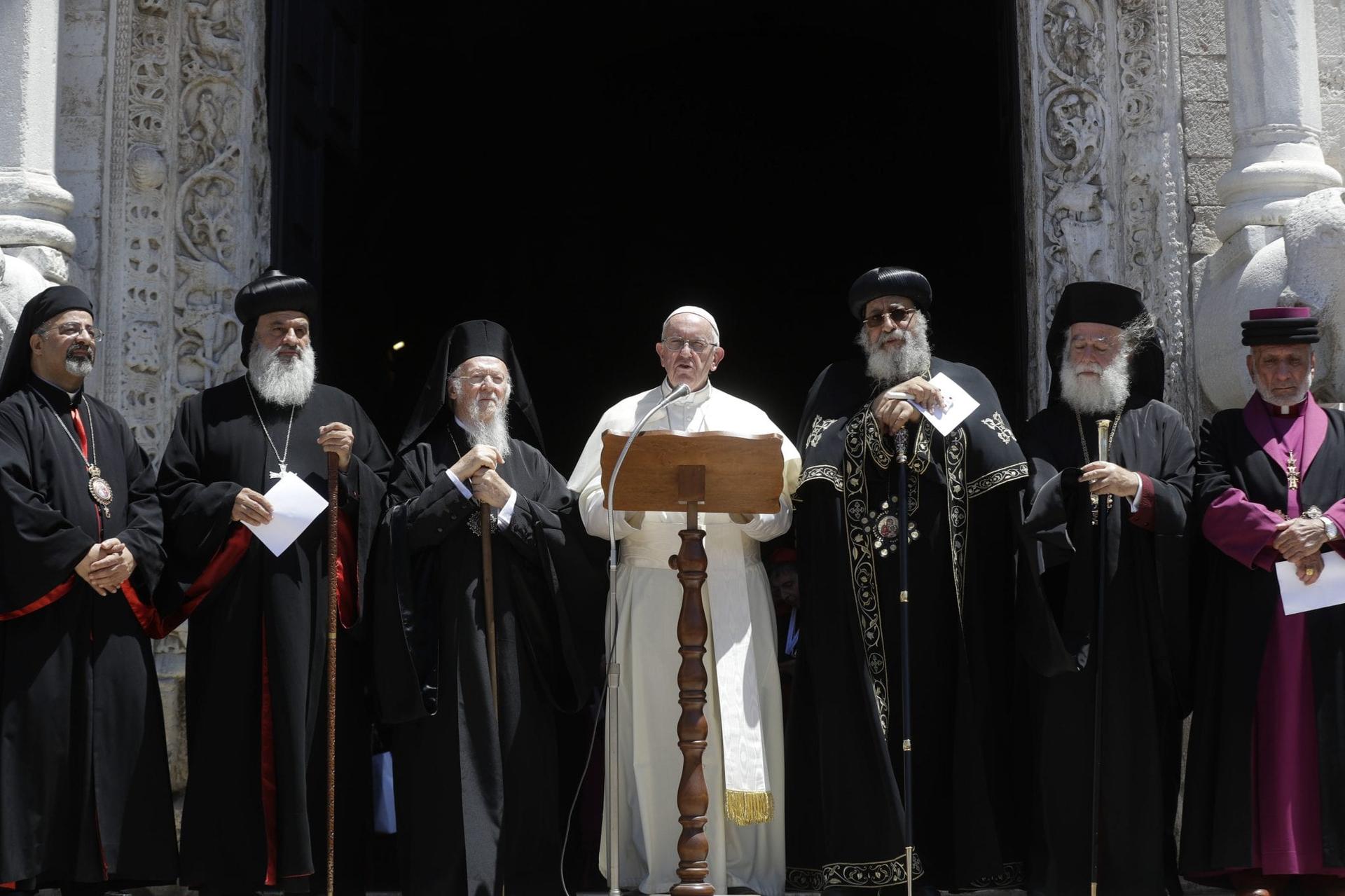Sunday marked the one-year anniversary since Pope Francis’s visit to the Southern Italian city of Bari, which has become the flagship of ecumenism and a center of a possible new solidarity across the Mediterranean Sea under this pontificate.
“Remembering the encounter that took place in Bari on July 7 of last year, we entrust to the Lord once more the prayer that Pope Francis along with the patriarchs and the heads of the Middle Eastern churches raised to God,” said a statement by the diocese of Bari-Bitonto on July 5.
Bari earned the title of Capital of Ecumenism last year when 19 religious leaders, including Eastern patriarchs and heads of churches in the Middle East, answered Francis’s call to join in prayer for peace in the Middle East along the city’s jagged coast.
The images of Christian leaders joined in a single cause sent a strong message of unity and symbolized an essential steppingstone in Francis’s efforts to renew and strengthen dialogue with Orthodox and Middle Eastern religious leaders.
“Today, as one, we want to kindle a flame of hope,” the pope said at the time, using the powerful imagery of Christians as single flames in the dark, tasked with the responsibility of keeping the light alive.
In Bari, Francis warned of “the dark clouds of war, violence and destruction, instances of occupation and varieties of fundamentalism, forced migration and neglect” that threaten to obliterate not just Christianity, but human dignity amid “the complicit silence of many.”
Perched just above the heel of the Italian boot-shaped peninsula, Bari is a unique outpost looking toward the Middle East. The city holds the treasured relics of St. Nicholas, a saint much beloved by Catholics and Orthodox alike.
Perhaps just as powerful as the image of the ecumenical prayer in Bari were the pictures of hundreds of pilgrims waiting for hours in line to see the relics of St. Nicholas in the Cathedral of Christ the Savior in Moscow, on loan from the Italian diocese from May-July 2017.
Russian President Vladimir Putin made a point of visiting the relics while in Moscow and according to Italian reports, he had intended to visit the diocese of Bari during his visit to Rome and the Vatican this July 4 but could not due to time constraints.
Bari has been a factory of strong ecumenical statements under Francis’s pontificate. It was a priest from Bari, Father Andrea Palmieri — the under-secretary of the Pontifical Council for the Promotion of Christian Unity — who personally accompanied the relics of St. Peter sent by Francis to Patriarch Bartholomew in Istanbul on the feast of Sts. Peter and Paul.
In the future, Bari might take on another important role as the preferred meeting ground for Mediterranean religious and political leaders.
February 19-23, Bari will host a summit of Catholic bishops from the countries that touch the Mediterranean Sea, now a basin of conflict and migrant deaths that local church leaders hope will become the face of a new and often underplayed Europe.
“Pope Francis will be among us once more, in Bari, Sunday February 23, 2020, to encounter the summit of bishops and celebrate Holy Mass with them and the people of God,” the statement by the diocese of Bari reads.
“We ask the Lord that, with his help, the commitment of all and the effort by each individual may make this part of the world evermore a frontier of peace and bringer of authentic humanity.”
It will be the second time the pope visits Bari and his third visit to the region, making it among Francis’s most visited destinations.
The pope’s special regard for the small southern city is clearly in line with his preference for the peripheries, but there are other reasons that help make Bari a fertile ground for the pope’s message.
“Bringing the Mediterranean together means to understand it, love it, conquer it, not with power but with civility,” said Cardinal Gualtiero Bassetti, President of the Italian Episcopal Conference, in a May interview with Avvenire, the Italian bishops’ publication.
“How is it possible that Europe is entirely conceived up North?” Bassetti asked. “Our continent cannot be imbalanced and influenced by market reasoning without building that indispensable social fabric of ‘common home’.”
“All of Europe is Mediterranean,” the cardinal concluded, promoting a vision of Europe that is projected toward the global south, with Italy at its center.
Italy was clearly split across the middle during the European parliament elections that took place in May, with the north overwhelmingly voting in favor of the populist right-wing Northern League party led by Matteo Salvini and the south, even if by a smaller margin, siding with the left-wing Five Star movement.
While the mention of Francis’s name was booed during a rally led by Salvini in the northern city of Milan, the southern cities resisted the populist and anti-immigrant wave sweeping across Italy and Europe despite being at the forefront of the migration flows crossing the Mediterranean Sea.
On the one-year anniversary of the momentous encounter of religious leaders in Bari the city has proven beyond any doubt to be a remarkable pool for ecumenism. But as struggles over immigration intensify in Europe and the stakes get higher, this small, often-overlooked city could become a diving board for a new Europe.
Follow Claire Giangravè on Twitter: @ClaireGiangrave
Crux is dedicated to smart, wired and independent reporting on the Vatican and worldwide Catholic Church. That kind of reporting doesn’t come cheap, and we need your support. You can help Crux by giving a small amount monthly, or with a onetime gift. Please remember, Crux is a for-profit organization, so contributions are not tax-deductible.











